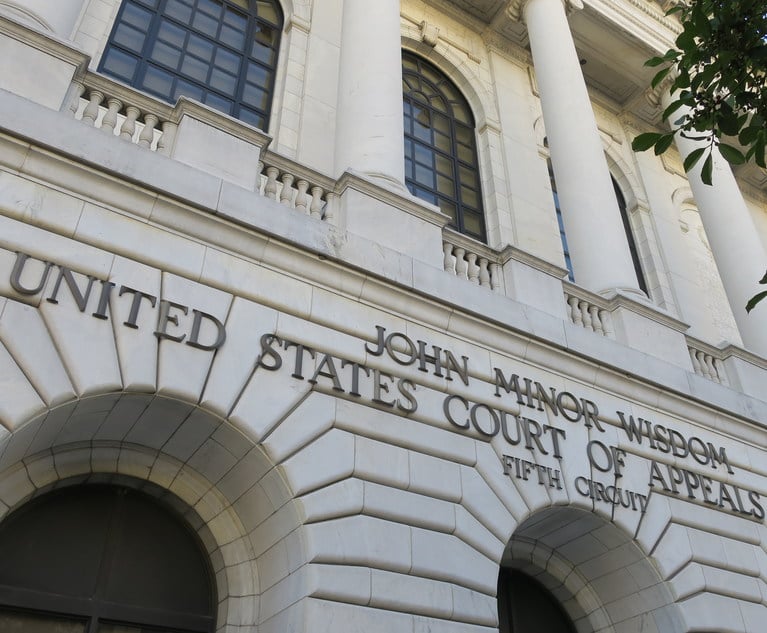 Championing gay rights at the U.S. Supreme Court in 2013. Credit: Diego M. Radzinschi/ ALM
Championing gay rights at the U.S. Supreme Court in 2013. Credit: Diego M. Radzinschi/ ALMConversations with Newsmakers: Greg Nevins on LGBT Workplace Fairness
Greg Nevins, the workplace fairness program strategist at Lambda Legal, is involved in three high-profile appeals court cases that consider whether LGBT employees can sue under federal civil rights law for alleged workplace discrimination.
October 27, 2017 at 04:22 PM
10 minute read
The conversation about how sexual orientation discrimination should be viewed in the workplace has quickly shifted in recent years.
For decades, courts ruled consistently against federal workplace protections for gay, lesbian and bisexual workers, deciding that it was clear in the statutory language of Title VII of the Civil Rights Act of 1964 that employers could not discriminate based on only these characteristics: sex, race, color, national origin and religion.
Now, an argument that would protect gay workers under existing federal law is gaining momentum.
 Gregory Nevins of Lambda Legal. Credit: John Disney/ALM
Gregory Nevins of Lambda Legal. Credit: John Disney/ALMOn the forefront of this change is Greg Nevins, who is involved in the three high-profile appeals court cases that consider whether employees could sue under federal civil rights law for alleged discrimination by their employers because they are gay. Nevins is the workplace fairness program strategist for Lambda Legal, the New York-based LGBT legal advocacy group.
Along with the U.S. Equal Employment Opportunity Commission, Lambda Legal has argued that sexual orientation should be protected under Title VII as sex discrimination. The U.S. Justice Department, under the leadership of Jeff Sessions, has taken the opposite view.
In Hively v. Ivy Tech Community College, Nevins won a landmark victory before the U.S. Court of Appeals for the Seventh Circuit. In the Second Circuit, he was amicus counsel in Zarda v. Altitude Express. He also argued, but lost, before the Eleventh Circuit in Evans v. Georgia Regional Hospital.
The three-judge panel sided with the employer in that case and Lambda Legal filed a petition urging the U.S. Supreme Court to take up the dispute.
Nevins spoke with The National Law Journal recently about the legal battle over sexual orientation protection and what hurdles persist. The conversation was edited for length and clarity.
The National Law Journal: How has the conversation shifted in the United States about sexual orientation discrimination in the workplace?
Nevins: What has been a challenge was to get a federal appellate court to rule that sexual orientation is also sex discrimination under Title VII. A lot of courts have said the opposite. A lot have said, “You have asked Congress to pass these protections for gay, lesbian and bisexual workers and they have said no.”
There were a series of cases and LGBT was striking out every time. [Then] about four or five years ago, there was a push to get courts to realize, “Hey, if it's okay for a man to date a woman, it has to be OK for a woman to date a woman, otherwise it's sex discrimination.” We really started pushing that out.
The EEOC looked at it carefully. The track record has been good. It's been remarkable the transformation that has happened with the law. You look at something—should knock on wood—Chief Judge [Robert] Katzmann's concurrence in the Christiansen v. Omnicom Group case and was as simple as, “If you ask the wrong question you'll get the wrong answer.” When they thought the question was, “Is sexual orientation in the statute?” The answer is that it's obviously not, but sex is in the statute. And then you have to ask, “What does it mean to discriminate on basis of sex?” If you treat a man and a woman different for the exact same thing, that is the definition of discrimination based on sex.
So, it was key to make sure the “right” arguments were crystallized for the courts?
Yes, exactly. In fact, the marriage equality decision is also relevant as far as nailing that down. When I say, “Hey, do you have to treat a man dating a woman the same as a woman dating a woman?” Well, people would look at you 15 years ago before Lawrence v. Texas and say, “Really?” You not only have invalidation of sodomy laws but you also have marriage equality. Marriage equality fits in in a plainspoken way: We have marriage equality. How can you possibly be fired for being gay?
How is marriage equality related to sexual orientation protection in the workplace?
The average person on the street says, “Gay people can get married, certainly you cannot fire someone for being gay.” But a smarty law student might say those are different things, one is constitutional, one is statute. But the person on the street is right. You can't treat men and women differently for the same thing. Now that marriage is the same thing for a man marrying a woman and a woman marrying a woman, it makes it that much clearer that it is sex discrimination. That argument now works on a commonsense level, but there is also a legal hook. The woman married to a woman is similarly situated to a man married to a woman.
What has Lambda Legal's role been in changing that conversation?
We are keeping an eye peeled for situations that are coming up in federal court to provide workers the legal representation they should have to make the case. It's a matter of making sure that employees have someone standing behind them and making the arguments that need to be made.
What hurdles do you still face?
We hope the Supreme Court resolves the issues once and for all. There's no reason why the Supreme Court shouldn't just take it and resolve it immediately, especially given the lower court split is profound. Now, you have the federal government split, with EEOC on one side and [U.S. Department of Justice] on the other. It screams out for the court to resolve the conflict.
What was your reaction when the DOJ came out and sided against you—and the EEOC?
Just that morning [President Donald Trump's] transgender military ban tweet came out, then evening was that brief. The community itself suffered a one-two punch. I thought it was awful that they weighed in and were relying on arguments that have been discredited. At the same time, we are always trying to make a silk purse out of a sow's ear. I think the one thing, it really makes clear that both we need a national answer to this question and now we know what all the arguments are against the position. Most courts will see they are not persuasive.
How significant is the split—two agencies go against each other?
It's highly unusual—let's just put it that way. Especially because here you have the exact two agencies that have responsibility for enforcing the statute. The EEOC has the lion['s] share of enforcement responsibilities with private sector and federal executive employment, which is the vast majority of federal and civilian workers. The DOJ would be the agency to bring a lawsuit. If government pursues a case, the EEOC handles private employees and DOJ does it if it's a state or local government issue. For those agencies to be at war with each other, it's just something that should not stand and the Supreme Court should straighten out.
What do you predict would happen if your side prevails in the Second Circuit?
When the Seventh Circuit ruled in the Hively case, Ivy Tech put out a statement that evening. They had a written statement saying they were not going to the Supreme Court. If we prevail in Second Circuit, Altitude Express could ask the Supreme Court to review it. Their position before the Second Circuit en banc was that somehow Don Zarda had failed to preserve that claim. They could go back to the trial court. They could settle the case. There are a lot of options. I doubt seriously that Altitude Express would push it to the Supreme Court. If they rule for Altitude Express, the estate of Don zarda would almost certainly push for it.
Is it a hurdle potentially that no company would want to be the face of sexual orientation discrimination, with so many major companies now supporting protections for LGBT workers?
Right, no one wants to be that. It's one reason we hope that the Supreme Court will take up the Evans case and recognize that they can't say, “Oh well, we'll pass on this one and take another one.” There are so many pieces that need to fall into place to make that happen. You know, this case was allowed that to happen because the Eleventh Circuit put the ball in our court. That's not something you should take for granted. Ivy Tech wanted nothing to do with an appeal. The ink wasn't even dry on the opinion before they hit send on that statement—or so it seems.
What is at stake?
Even though I'm pushing the message that the momentum is on our side, there is a mountain of authority against us in circuits that has not been overruled that puts on shakier legal ground each passing day. It still is the case that in most circuits that there is a holding or language from old opinions that say you can't bring this claim.
If you are a plaintiff-side Title VII lawyer, you are used to cases where someone says they were discriminated against because “I was catholic or latino or of Iranian descent.” The one thing you don't have to worry about if everything they say is true, is the question of “Do i still have a claim?” It presents a huge challenge to take this case that they have to fight for the right just to bring the claim. So, it is very important that this becomes established. Just because we have the momentum on our side, we need to push that through to victory.
What has the company response been to this issue?
Companies can say we need a national solution. They say, “We think that employees do better and are better if they don't fear discrimination.” If an employer has great policies, but it's a national company and something goes wrong, usually the fact that they have good policies doesn't take care of the problem for employee.
These employees can't rely on the policy to get into court. Even though there are great companies that make it their statements of principle and backing it up with HR efforts to eradicate LGBT discrimination, there still is a problem that is only internal to the company and is only something you can vindicate in court. At the end of the day, what we hope will happen, basically that we will have a clear statement of what law is and that's not only and it just won't happen as much. The best way for it not to happen is to have everyone know it's unlawful to let it happen.
Read more:
This content has been archived. It is available through our partners, LexisNexis® and Bloomberg Law.
To view this content, please continue to their sites.
Not a Lexis Subscriber?
Subscribe Now
Not a Bloomberg Law Subscriber?
Subscribe Now
NOT FOR REPRINT
© 2025 ALM Global, LLC, All Rights Reserved. Request academic re-use from www.copyright.com. All other uses, submit a request to [email protected]. For more information visit Asset & Logo Licensing.
You Might Like
View All
Legal Issues to Watch in the US Appeals Courts in 2025

Second Circuit Upholds $5M Judgment Against Trump in E. Jean Carroll Case
4 minute read
Divided 5th Circuit Shoots Down Nasdaq Diversity Rules

Nevada Supreme Court to Decide Fate of Groundbreaking Contingency Cap Ballot Measure
5 minute readTrending Stories
- 1Decision of the Day: Uber Cannot Be Held Vicariously Liable for Driver's Alleged Negligent Conduct
- 2TikTok Law and TikTok Politics
- 3California Supreme Court Vacates Murder Conviction in Infant Abuse Case
- 4New York’s Proposed Legislation Restraining Transfer of Real Property
- 5Withers Hires Lawyers, Staff From LA Trusts and Estates Boutique
Who Got The Work
Michael G. Bongiorno, Andrew Scott Dulberg and Elizabeth E. Driscoll from Wilmer Cutler Pickering Hale and Dorr have stepped in to represent Symbotic Inc., an A.I.-enabled technology platform that focuses on increasing supply chain efficiency, and other defendants in a pending shareholder derivative lawsuit. The case, filed Oct. 2 in Massachusetts District Court by the Brown Law Firm on behalf of Stephen Austen, accuses certain officers and directors of misleading investors in regard to Symbotic's potential for margin growth by failing to disclose that the company was not equipped to timely deploy its systems or manage expenses through project delays. The case, assigned to U.S. District Judge Nathaniel M. Gorton, is 1:24-cv-12522, Austen v. Cohen et al.
Who Got The Work
Edmund Polubinski and Marie Killmond of Davis Polk & Wardwell have entered appearances for data platform software development company MongoDB and other defendants in a pending shareholder derivative lawsuit. The action, filed Oct. 7 in New York Southern District Court by the Brown Law Firm, accuses the company's directors and/or officers of falsely expressing confidence in the company’s restructuring of its sales incentive plan and downplaying the severity of decreases in its upfront commitments. The case is 1:24-cv-07594, Roy v. Ittycheria et al.
Who Got The Work
Amy O. Bruchs and Kurt F. Ellison of Michael Best & Friedrich have entered appearances for Epic Systems Corp. in a pending employment discrimination lawsuit. The suit was filed Sept. 7 in Wisconsin Western District Court by Levine Eisberner LLC and Siri & Glimstad on behalf of a project manager who claims that he was wrongfully terminated after applying for a religious exemption to the defendant's COVID-19 vaccine mandate. The case, assigned to U.S. Magistrate Judge Anita Marie Boor, is 3:24-cv-00630, Secker, Nathan v. Epic Systems Corporation.
Who Got The Work
David X. Sullivan, Thomas J. Finn and Gregory A. Hall from McCarter & English have entered appearances for Sunrun Installation Services in a pending civil rights lawsuit. The complaint was filed Sept. 4 in Connecticut District Court by attorney Robert M. Berke on behalf of former employee George Edward Steins, who was arrested and charged with employing an unregistered home improvement salesperson. The complaint alleges that had Sunrun informed the Connecticut Department of Consumer Protection that the plaintiff's employment had ended in 2017 and that he no longer held Sunrun's home improvement contractor license, he would not have been hit with charges, which were dismissed in May 2024. The case, assigned to U.S. District Judge Jeffrey A. Meyer, is 3:24-cv-01423, Steins v. Sunrun, Inc. et al.
Who Got The Work
Greenberg Traurig shareholder Joshua L. Raskin has entered an appearance for boohoo.com UK Ltd. in a pending patent infringement lawsuit. The suit, filed Sept. 3 in Texas Eastern District Court by Rozier Hardt McDonough on behalf of Alto Dynamics, asserts five patents related to an online shopping platform. The case, assigned to U.S. District Judge Rodney Gilstrap, is 2:24-cv-00719, Alto Dynamics, LLC v. boohoo.com UK Limited.
Featured Firms
Law Offices of Gary Martin Hays & Associates, P.C.
(470) 294-1674
Law Offices of Mark E. Salomone
(857) 444-6468
Smith & Hassler
(713) 739-1250










